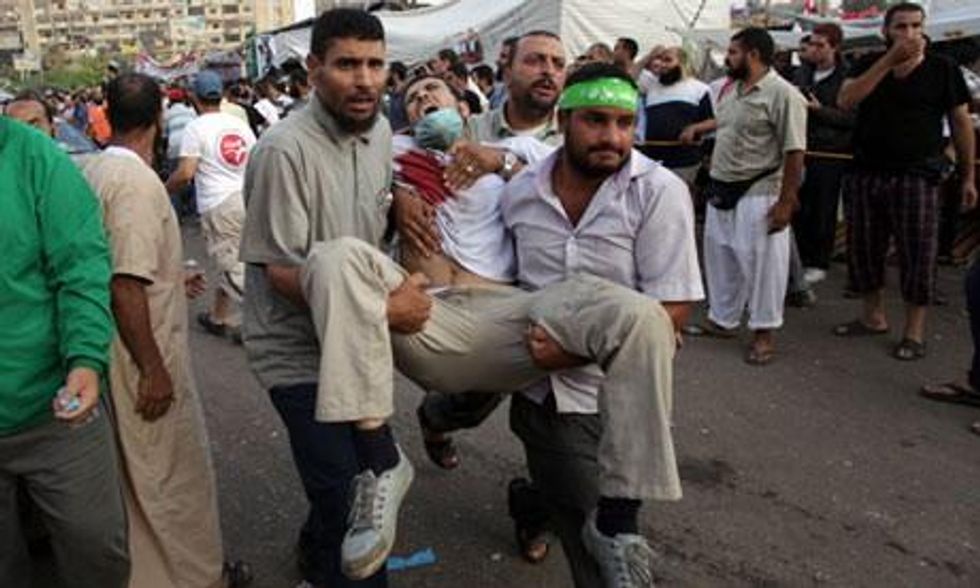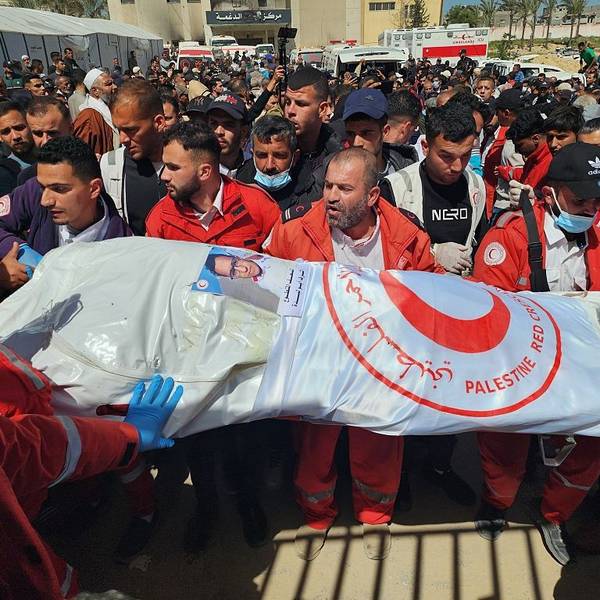Military Massacre in Cairo: Shooting 'Not to Wound, But to Kill'
Security forces open fire on pro-Morsi supporters with over one hundred reported dead, more wounded

Turning the fears of many into reality, the political tensions following the recent military takeover of the country took another lethal turn after security forces turned their guns on supporters of ousted President Mohamed Morsi, with reports saying that well over one hundred people could be dead with many more wounded.
The exact number of dead was not clear, but reports ranged from 70 to more than 130 with makeshift hospitals and morgues filling up with bodies and ambulances cascading through the streets.
The shooting began in the pre-dawn hours in Cairo in an area where members of Morsi's Muslim Brotherhood were holding a ongoing sit-in calling for his release and an end to the military takeover.
"They are not shooting to wound, they are shooting to kill," Brotherhood spokesman Gehad El-Haddad told Reuters in the aftermath.
Haddad said police started firing repeated rounds of teargas after 3:00 a.m. local time, aiming at protesters who had spilled out of the main area of the sit-in were on a main thoroughfare near Nasr City.
In addition to "special police forces in black uniforms" firing live rounds, Haddad described sniper shots from the roofs of nearby buildings and a bridge.
A doctor at the make-shift morgue nearby said "most of the dead were hit in the head, some between the eyes."
Al Jazeera spoke to Amr Gamal, an anti-military supporter who was in Nasr City during the clashes:
The Guardian's correspondent Patrick Kingsley, said the hospitals were overwhelmed, tweeting:
Indepenent journalist Sharif Adbel Kouddous is tweeting from Cairo:
And follow Kingsley's Twitter feed here:
________________________________
An Urgent Message From Our Co-Founder
Dear Common Dreams reader, The U.S. is on a fast track to authoritarianism like nothing I've ever seen. Meanwhile, corporate news outlets are utterly capitulating to Trump, twisting their coverage to avoid drawing his ire while lining up to stuff cash in his pockets. That's why I believe that Common Dreams is doing the best and most consequential reporting that we've ever done. Our small but mighty team is a progressive reporting powerhouse, covering the news every day that the corporate media never will. Our mission has always been simple: To inform. To inspire. And to ignite change for the common good. Now here's the key piece that I want all our readers to understand: None of this would be possible without your financial support. That's not just some fundraising cliche. It's the absolute and literal truth. We don't accept corporate advertising and never will. We don't have a paywall because we don't think people should be blocked from critical news based on their ability to pay. Everything we do is funded by the donations of readers like you. Will you donate now to help power the nonprofit, independent reporting of Common Dreams? Thank you for being a vital member of our community. Together, we can keep independent journalism alive when it’s needed most. - Craig Brown, Co-founder |

Turning the fears of many into reality, the political tensions following the recent military takeover of the country took another lethal turn after security forces turned their guns on supporters of ousted President Mohamed Morsi, with reports saying that well over one hundred people could be dead with many more wounded.
The exact number of dead was not clear, but reports ranged from 70 to more than 130 with makeshift hospitals and morgues filling up with bodies and ambulances cascading through the streets.
The shooting began in the pre-dawn hours in Cairo in an area where members of Morsi's Muslim Brotherhood were holding a ongoing sit-in calling for his release and an end to the military takeover.
"They are not shooting to wound, they are shooting to kill," Brotherhood spokesman Gehad El-Haddad told Reuters in the aftermath.
Haddad said police started firing repeated rounds of teargas after 3:00 a.m. local time, aiming at protesters who had spilled out of the main area of the sit-in were on a main thoroughfare near Nasr City.
In addition to "special police forces in black uniforms" firing live rounds, Haddad described sniper shots from the roofs of nearby buildings and a bridge.
A doctor at the make-shift morgue nearby said "most of the dead were hit in the head, some between the eyes."
Al Jazeera spoke to Amr Gamal, an anti-military supporter who was in Nasr City during the clashes:
The Guardian's correspondent Patrick Kingsley, said the hospitals were overwhelmed, tweeting:
Indepenent journalist Sharif Adbel Kouddous is tweeting from Cairo:
And follow Kingsley's Twitter feed here:
________________________________

Turning the fears of many into reality, the political tensions following the recent military takeover of the country took another lethal turn after security forces turned their guns on supporters of ousted President Mohamed Morsi, with reports saying that well over one hundred people could be dead with many more wounded.
The exact number of dead was not clear, but reports ranged from 70 to more than 130 with makeshift hospitals and morgues filling up with bodies and ambulances cascading through the streets.
The shooting began in the pre-dawn hours in Cairo in an area where members of Morsi's Muslim Brotherhood were holding a ongoing sit-in calling for his release and an end to the military takeover.
"They are not shooting to wound, they are shooting to kill," Brotherhood spokesman Gehad El-Haddad told Reuters in the aftermath.
Haddad said police started firing repeated rounds of teargas after 3:00 a.m. local time, aiming at protesters who had spilled out of the main area of the sit-in were on a main thoroughfare near Nasr City.
In addition to "special police forces in black uniforms" firing live rounds, Haddad described sniper shots from the roofs of nearby buildings and a bridge.
A doctor at the make-shift morgue nearby said "most of the dead were hit in the head, some between the eyes."
Al Jazeera spoke to Amr Gamal, an anti-military supporter who was in Nasr City during the clashes:
The Guardian's correspondent Patrick Kingsley, said the hospitals were overwhelmed, tweeting:
Indepenent journalist Sharif Adbel Kouddous is tweeting from Cairo:
And follow Kingsley's Twitter feed here:
________________________________

